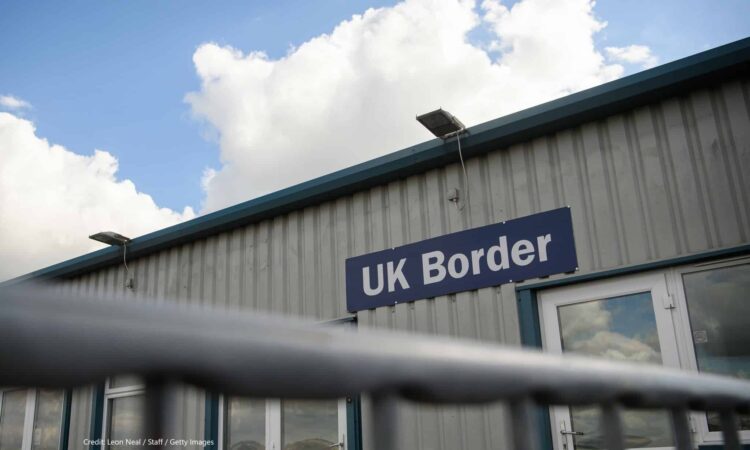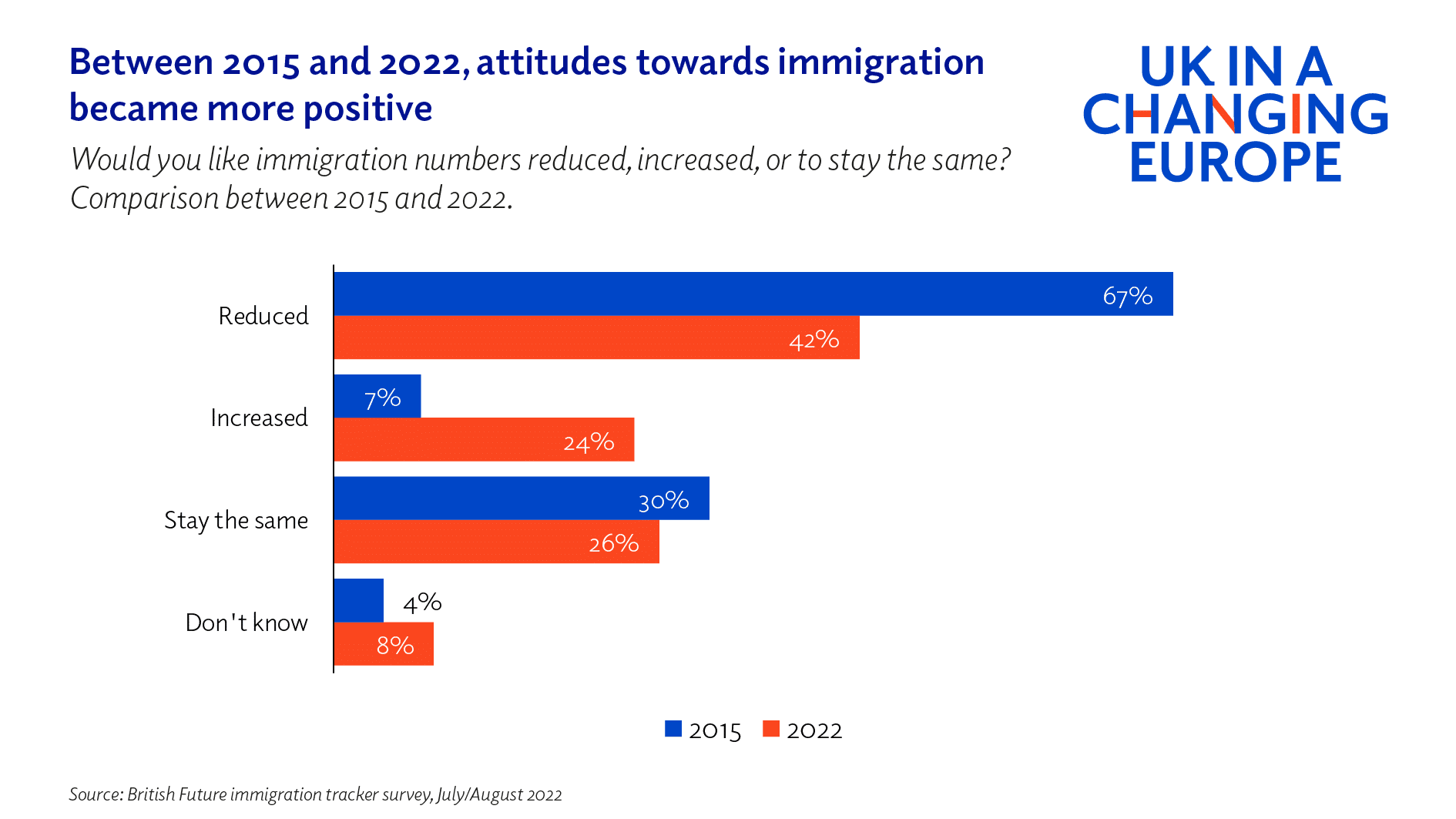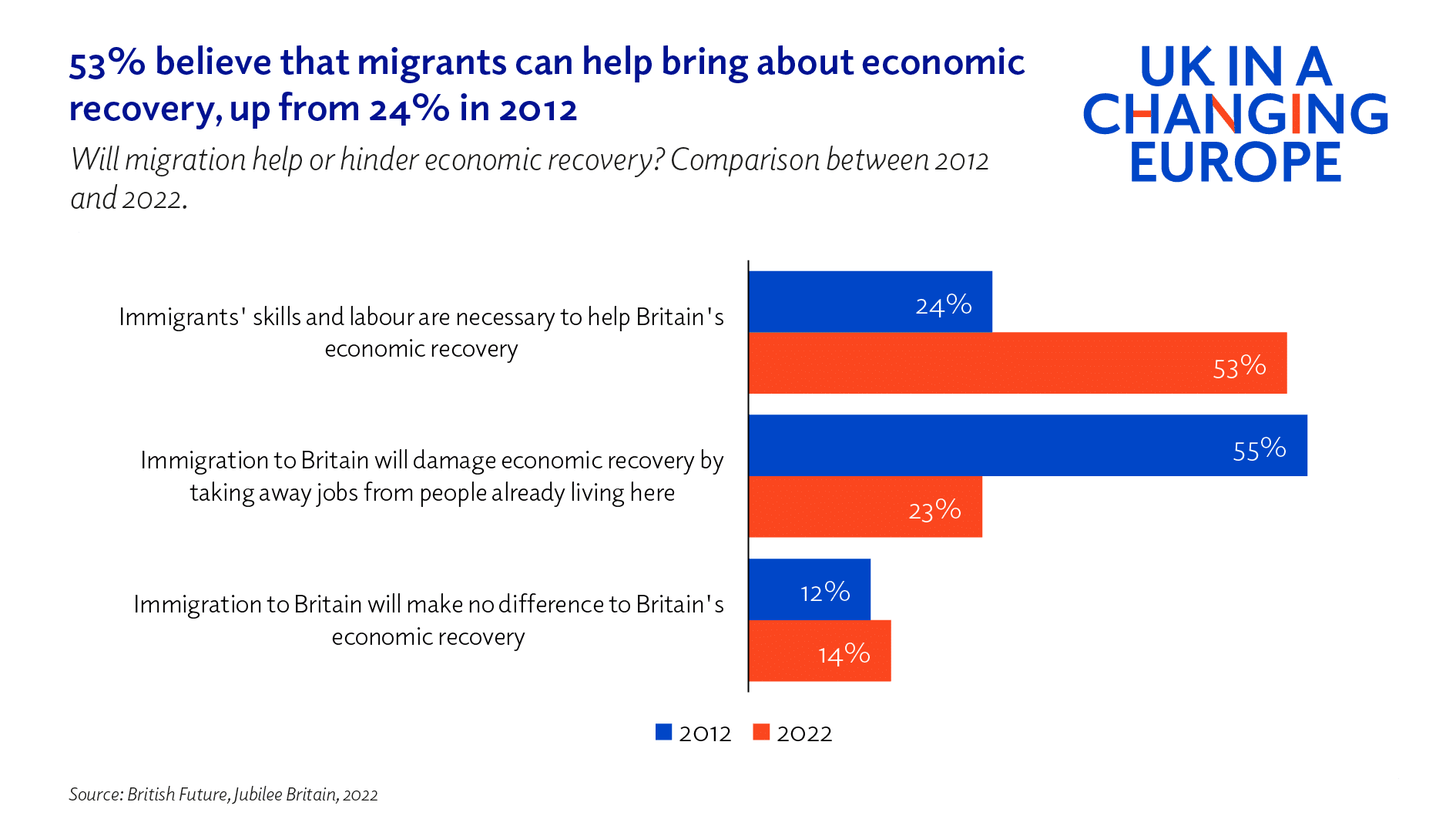
New migration figures out today show net migration at record numbers in the 12 months since May 2022, with the net migration figure at 606,000. Heather Rolfe looks at how news of this increase is likely to be received by the British public, and at the government’s options to bring numbers down.
Conservative politicians, including Home Secretary Suella Braverman, have warned that that urgent action is needed to reduce numbers, citing public attitudes. Yet our immigration tracker survey with Ipsos shows a different picture. While 42% would like to see immigration reduced, 26% say they would like it to stay the same, and 24% would like it to increase. This represents a big change since 2015 when 67% wanted migration levels to fall and 7% wanted it to increase.

Awareness of this seven-year shift in attitudes is low: most people think that the attitudes of others have become more negative, rather than more positive. Yet, as the economic and social context of migration has changed since the referendum, so have people’s perspectives: 46% see migration as positive and 29% as negative, compared to 35% and 41% respectively in 2015.
When asked why they are now more positive since the EU referendum, the most common reason is awareness of the role of migrants in key services during the pandemic, given by 52%.‘Discussions which have highlighted the contribution of migrants to the UK’ is cited by 42%. For some, the end of free movement is an important factor, and others had been influenced by knowing more migrants. Migration appears to have become normalised, and overtaken by concerns about the economy.
Post-Covid economic recession and labour shortages across sectors have highlighted skills and labour gaps. 53% believe that migrants can help bring about economic recovery and only 23% think they will damage it by taking jobs away from British workers; this is an exact reversal of attitudes in 2012. Attitudes have become much more pragmatic than ideological.

This is reflected in strong public support for increased migration in some sectors: more than half of people would like more migrant doctors and nurses, and 44% favour an increase in migrant social care workers. More people support increases than reductions in the number of migrant fruit pickers and hospitality staff. They also support increasing or keeping current levels of migration in construction and hospitality. More generally, two-thirds of our tracker respondents say that employers should be able to recruit to any job with skills shortages.

How might the government go about reducing migration?
The government has a number of options if it wants to reduce net migration, most of which have consequences for the economy and for the public purse. Here are some:
Option 1, reducing work visas through a cap on numbers, is likely to damage sectors where skills shortages are most severe: health and social care will be particularly affected since the sector accounts for 45% of visas. Information and Communications businesses will also suffer, along with those who recruit to Professional, Scientific and Technical occupations. These two sectors account for almost a quarter of visas. The other two large recruiters are Finance and Manufacturing. These are all sectors of vital importance and where skills shortages also have a ripple effect on the economy.
Option 2 is to remove some categories from the net migration figures. Students currently account for x% of new migrants, yet the vast majority don’t stay permanently. People are often surprised to learn that students are included in the figures. Reducing overseas student numbers would have negative impacts on universities and the towns and cities in which they are located, as well as the wider UK economy since they bring in an estimated £41.9 billion. Any reduction is unlikely to have public support, since two-thirds of people would like their numbers to stay the same or increase.
There’s no quick and easy fix for skills shortages
Option 3 would be to develop strategies to increase the supply of people within the UK. While it’s often said shortages can be resolved by increasing pay and training, it is rarely that simple. It requires long-term collaboration between employers and the education system, and between employers themselves.
While skills, wages, location and working conditions are the main reasons for shortages, these configure very differently between sectors and occupations. Specific strategies would include funding social care at the level needed for staff to be paid well; improving conditions and work culture within the NHS to improve retention; building better career paths in hospitality through collaboration between larger and smaller employers; and boosting funding for vocational courses in sectors such as engineering.
Working conditions are more difficult to change: meat and fish processing factories have struggled for decades to recruit British workers. You can’t reduce the noise, sights and smells to make these nicer places to work. Along with agriculture, food processing often takes place in rural areas with no public transport and sparse local communities. Seasonal work and variable hours are also part of the business model of the food sector, making it difficult for families needing a regular income.
These are reasons why migrants have worked in these sectors for many decades. People understand why employers recruit migrants to lower skilled jobs in places like hotels, warehouses and farms. As research by NIESR found, many people are familiar with such work and understand why local people turn it down.
Settled and returning migrants can also help meet shortages
Option 4 would be to include settled migrants and those on non-work visas in skills shortage strategies. The migration figures include substantial numbers fleeing war and political oppression in Ukraine and Hong Kong. They include many with skills and experience, yet they face barriers to employment including English language, recognition of qualifications and understanding of the UK labour market. Addressing these challenges and ensuring that our careers service can meet their needs would be an easy way of increasing supply to shortage sectors and occupations.
While the Home Secretary is focused on numbers, people are having more constructive and realistic discussions with their family, friends and colleagues. Making promises to reduce migration in order to assuage perceived public preferences would not only be tone deaf; it risks a return to the numbers game and reviving the toxic debate of the referendum period.
Instead, the government needs to set out a realistic, detailed and sector focused plan where migration and domestic supply can be combined to meet the needs of the economy and our society.
By Dr Heather Rolfe, Director of Research and Relationships, British Future.






